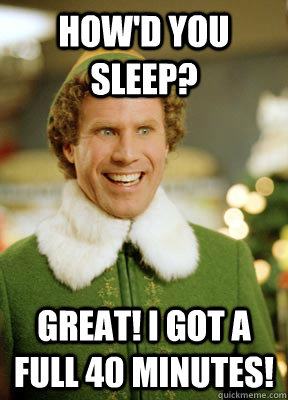Sleep Disorders
"I’m so tired my tired is tired"What is Sleep?
Sleep is “a naturally occurring, reversible, periodic and recurring state in which consciousness and muscular activity is temporarily suspended or diminished and outside stimuli is reduced.” Most people need a certain amount of sleep to function adequately, and the quantity varies substantially. The range usually falls within 4 to 9 hours with 7 or 8 hours of sleep per day being the norm. Quality of sleep is another consideration, as uninterrupted sleep is important in order for our brains to conduct its restorative functions.
What is sleep deprivation?
Sleep deprivation occurs when a person does not get sufficient amounts of quality sleep and/or experiences a circadian rhythm disturbance. Work demands, family life, calls in the middle of the night and lifestyle choices may cause a person to sleep fewer hours than their body needs to maintain wakefulness and energy levels.
How many of us have endured sleep deprivation? If we’re honest, that number can be close to 100 percent because we all have had those nights where the calls came in one after another. Follow that with a day of off-duty events, and it’s easy to see how we can’t get caught up on rest.
Circadian Rhythm
A circadian rhythm is any biological process that displays an endogenous, entrainable oscillation of about 24 hours. A circadian clock drives these 24-hour rhythms, and they have been widely observed in plants, animals, fungi, and cyanobacteria.
https://study.com/academy/lesson/what-is-circadian-rhythm-definition-lesson-quiz.html
Are you sleep deprived?
Here are some indications that you may not be getting enough sleep:
- You need an alarm clock to wake you up at the appropriate time.
- You struggle to get out of bed in the morning.
- You feel irritable, tired, and stressed during the week.
- You have trouble concentrating and remembering.
- You fall asleep in warm rooms during meetings or classroom training.
- You need a nap to get through the day.
- You feel drowsy while driving.
- You fall asleep within five minutes of going to bed.
REM Sleep
A kind of sleep that occurs at intervals during the night and is characterized by rapid eye movements, more dreaming and bodily movement, and faster pulse and breathing.
The effects of sleep deprivation
Sleep loss is cumulative and creates a sleep debt. Larger sleep debts require greater amounts of restorative sleep to return the body and mind to normal, rested levels. In a controlled study, people who slept only four to five hours per night for one week needed two full nights of sleep to recover normal levels of performance and mood.
Sleep deprivation affects mental processes and intellectual abilities. Studies of paramedic students show that losing only one night’s sleep caused medical knowledge test scores to drop. Sleep deprivation impedes decision-making and memory. It reduces performance on challenging tasks and negatively affects psychomotor skills. Mood, productivity, and communication skills suffer. Increased rates of errors and on-the-job injuries are also attributed to sleepiness and fatigue. Extended periods without sleep may cause hallucinations and paranoia.
Physical and mental performances are not the only casualties of sleep deprivation. Even a minimal loss of sleep effects general health. Chronic lack of sleep can contribute to serious health problems and even shortened lifespan.
Other effects of chronic sleep deprivation include depression and mood swings; gastrointestinal dysfunction; adult-onset diabetes; menstrual and infertility problems; increased use of drugs and alcohol; impaired sexual function; less satisfaction in personal and domestic pursuits; increased appetite and weight gain; and personality changes, particularly loss of humor and increased ill temper.
Countermeasures and Coping Strategies
Quality sleep is the primary weapon in the battle against sleep deprivation. Firefighters must take advantage of opportunities for sleep, both on and off duty. Sleeping areas at home and at the fire station should be quiet and dark, and the room temperature should be cool. A comfortable, good-quality mattress is necessary. Invest in comfortable bedding and pillows as well. Good sleep habits are essential. Firefighters need to get an adequate amount of uninterrupted sleep every off-duty night. Going to sleep and waking up at the same times every day, even on weekends, is important for maintaining the body’s natural rhythms.
Tips for Quality Sleep
- Avoid eating, reading, and watching TV in bed.
- Avoid nicotine prior to bedtime. Better yet, give up tobacco altogether.
- Restrict caffeine intake, and avoid caffeinated drinks at least six hours before bedtime.
- Eat healthful foods. Do not eat large meals within four to five hours of sleeping.
- Do not use alcohol to induce sleep. The effects of alcohol-induced drowsiness last only a few hours and cause poor-quality sleep.
- Avoid long-term use of over-the-counter sleeping pills. Habitual use can reduce effectiveness and lead to addiction.
- Reduce life stress as much as possible.
- Use relaxation techniques to relieve stress and invite sleep.
- Exercise, but not more than four hours before bedtime. For 24-hour shift workers, outdoor exercise during daylight hours can help the body maintain natural biological rhythms and increase sleep quality off-duty.

Self Help Goals
Thought Goal: I am having trouble sleeping because I think… (Insert problematic thought here)… I can stop or lessen my issues with sleep by thinking… (i.e., remembering I can only solve so much in one day, that I matter and sleep is important for my health, I am going to be ok, etc.).
Feeling Goal: I am having trouble sleeping because I feel… (Insert problematic feeling here)…. I can stop or lessen my issues with sleep by feeling… (That I am loved and important to my family, friends, etc., that I get to have time “off” and to myself where my body can be restored, etc.).
Behavior Goal: I am having trouble sleeping because my behavior… (Insert problematic behavior here)…. I can stop or lessen my issues with sleep by behaving… (In ways that make you feel more like you (exercising, eating better, taking care of myself, etc.), reaching out when you need someone to talk to, taking care of yourself through regular medical checkups, etc.).
FOR AN EMERGENCY SITUATION NEEDING ASSISTANCE ASAP – CONTACT 911
Disclaimer
The information provided is just a resource and should never be substituted for professional help.
If you are in need of assistance, please click the Jorgensen Brooks – EAP button to get information about the resources available.
